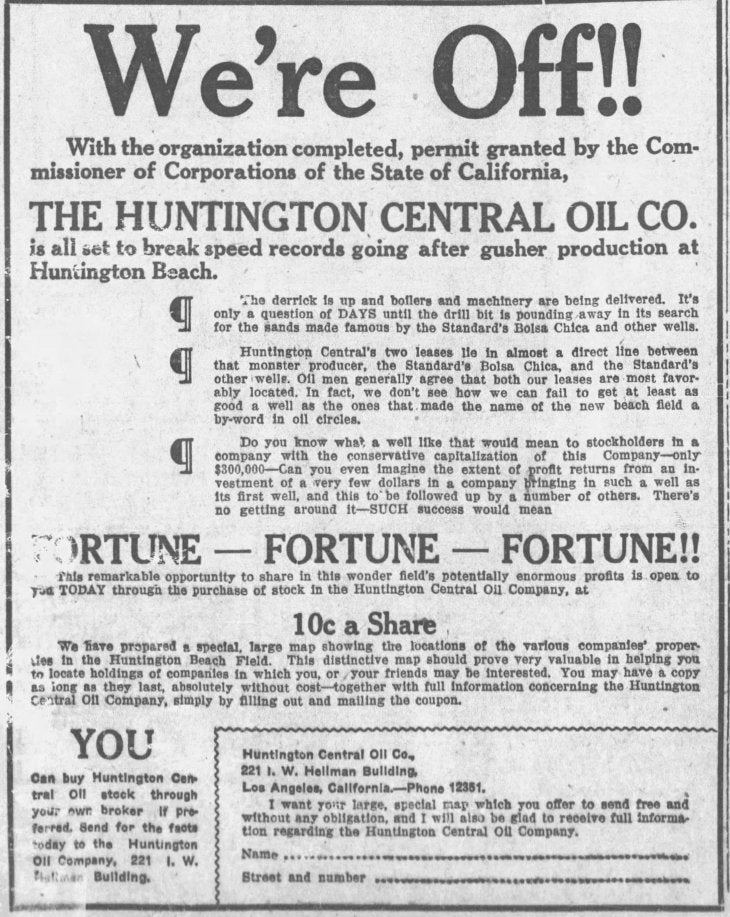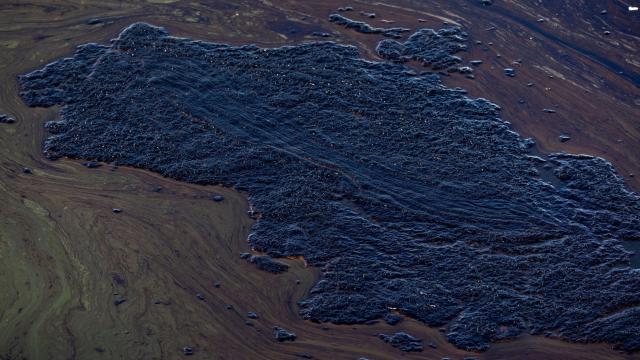The Southern California city of Huntington Beach is currently covered with crude oil from a pipeline breach. It may be jarring to see officials rushing to save a California beach from a crude spill, but the city’s culture has been awash in oil for decades. You can look no further than the local high school mascot.
Huntington Beach High School’s team name is the Oilers, and its logo is a drilling derrick. The school is not sheepish about its mascot, either. Its website is HBOilers.com, where the school cheerily notes, “Do not be fooled by our laid-back, beach atmosphere; Oilers put in work.” On its phone voicemail, a woman cheerily says “Go Oilers!” Huntington Beach High School’s mascot is an oil worker clad in orange and black named Derrick. (Get it?) Jeremy Deaton, an alum of the high school, said on Twitter that the school’s colours were even orange for the California sunset and black for oil. It’s… a lot.
Deaton grew up in the city and graduated from Huntington Beach High School in 2013. “As a teenager, I actually thought it was great, not because I was a fan of oil, but because I liked that our high school had a mascot that was rooted in our city’s history,” he said in a text message. “Lots of high schools have mascots that have nothing to do with anything — lions and vikings and so on. So, it genuinely felt special.”
He didn’t think much about environmental issues as a teenager, which isn’t shocking, considering how much fossil fuel propaganda gets into school curricula and how little climate education kids in school receive. Today, he’s steeped in these issues and thinks it’s time to change the mascot.

“I think it’s significant that the high school maintains the oiler as its mascot, both because the school exists to serve young people–who are most imperiled by climate change — and because the school has been around for so long that a lot of the city’s history is invested in that particular institution,” Deaton said.
Oil played a major role in shaping Huntington Beach. The region has been a fossil fuel hub for a century. In the 1910s, oil was discovered beneath the beach, and soon after, Standard Oil began extracting it. The industry sparked the town’s population growth, giving it the nickname Oil City.
But oil isn’t the only aspect of Huntington Beach’s history. The city helped build part of NASA’s Saturn V rocket, which was used to get a man on the moon for the first time. “It also has produced some of the best surfers in the world. So there’s a lot to be proud of,” Deaton said.
Even before this past weekend’s spill, the fossil fuel sector’s local legacy has been far from all rosy. It’s also been a source of toxic air pollution and planet-warming greenhouse gases. This isn’t the area’s first big leak, either; an oil tanker ruptured in 1990, unleashing 1,476,310 l of oil. (There are plenty of other ones as well.) Then, as now, the spill threatened wildlife and sensitive ecosystems along a key bird migration corridor.

“It’s weird that we choose to celebrate oil, which actually threatens — as demonstrated this week — so much of what makes HB a wonderful place: the pristine beach, surf culture, the Bolsa Chica wetlands,” said Deaton. “I mean, the Huntington Beach Conference and Visitor’s Bureau has trademarked the name ‘Surf City.’ You can’t surf if the ocean is covered in oil.”
I don’t mean to suggest that Huntington Beach is responsible for the fossil fuel sector’s hold on California, but romanticizing an industry that threatens local communities and habitats is not the move. With the need to wind down the industry growing more urgent, the school’s mascot could soon be obsolete anyway. But there’s no need to wait for that day to come. Huntington Beach High School, if you’re reading this, be proactive. The rockets, the surfers, or the dolphins are all there for the taking if you want to root a mascot with deep local history and legacy. Oil isn’t the only option.
“I think it’s important as a statement of which parts of our history we decide to honour,” said Deaton.
